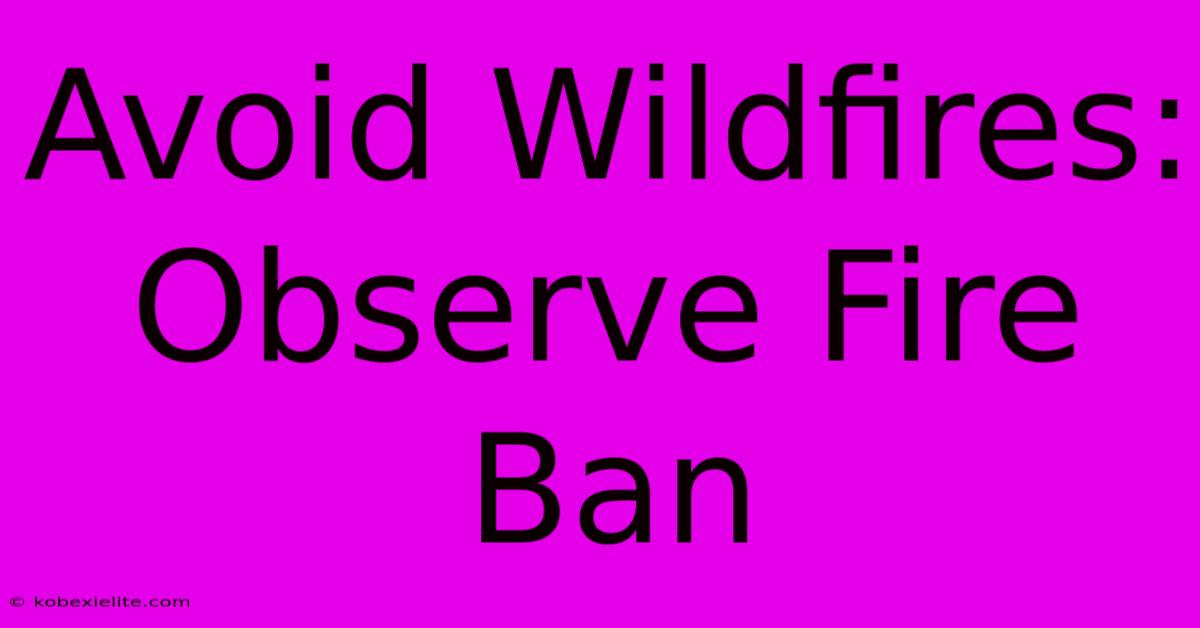Avoid Wildfires: Observe Fire Ban

Discover more detailed and exciting information on our website. Click the link below to start your adventure: Visit Best Website mr.cleine.com. Don't miss out!
Table of Contents
Avoid Wildfires: Observe Fire Bans
Wildfires are devastating natural disasters that can cause widespread destruction, loss of life, and significant environmental damage. Understanding and respecting fire bans is crucial to preventing these catastrophic events. This article will delve into the importance of observing fire bans, the reasons behind them, and the steps you can take to prevent wildfires.
Understanding Fire Bans
A fire ban, also known as a burn ban, is a temporary restriction on the use of open flames and other ignition sources in a designated area. These bans are implemented by local, state, or federal authorities when conditions are particularly dry and the risk of wildfires is extremely high. Ignoring a fire ban can result in hefty fines and even criminal charges.
Why are Fire Bans Necessary?
Several factors contribute to the need for fire bans:
- Extreme Drought: Prolonged periods without rainfall leave vegetation extremely dry and highly flammable. Even a small spark can quickly ignite a large-scale wildfire under these conditions.
- High Winds: Strong winds can rapidly spread wildfires over vast areas, making them incredibly difficult to control.
- Low Humidity: Low humidity levels further exacerbate the dryness of vegetation, increasing the risk of fire ignition and rapid spread.
- High Temperatures: Extreme heat dries out vegetation, creating ideal conditions for wildfires to start and spread uncontrollably.
These conditions create a "perfect storm" for wildfire outbreaks. Fire bans are a crucial preventative measure to mitigate this risk.
How to Avoid Contributing to Wildfires
Even with a fire ban in place, accidents can still happen. Here are some key steps to take to prevent wildfires:
- Check for Current Fire Bans: Before engaging in any outdoor activity that could potentially cause a fire, always check for current fire bans in your area. Information is typically available on local news websites, government websites, and social media.
- Avoid Open Flames: During fire ban periods, strictly avoid all open flames, including campfires, bonfires, charcoal grills, and even cigarettes. Even seemingly small sparks can ignite dry brush.
- Properly Dispose of Smoking Materials: If you must smoke, ensure your cigarettes are completely extinguished and disposed of properly in a designated ashtray or other fire-safe container. Never discard cigarette butts directly onto the ground.
- Use Caution with Machinery: Operating machinery, such as lawnmowers, chainsaws, and other equipment, can generate sparks. Take extra precautions to ensure your equipment is in good working order and that you are using it safely during dry conditions.
- Be Mindful of Vehicle Exhaust: Hot exhaust systems on vehicles can ignite dry grass. Park vehicles only on paved surfaces or areas free of dry vegetation.
- Report Suspicious Activity: If you see anything that could potentially start a wildfire, such as unattended fires or suspicious activity, report it immediately to the appropriate authorities.
Consequences of Ignoring Fire Bans
Ignoring fire bans is not only irresponsible but also carries significant consequences:
- Fines: Violators can face substantial fines, potentially thousands of dollars.
- Criminal Charges: In severe cases, individuals may face criminal charges, including arson, depending on the extent of the damage caused.
- Civil Liability: If your actions cause a wildfire, you may be held civilly liable for the damages, including property loss and injury.
Protecting Our Communities: A Shared Responsibility
Preventing wildfires is a collective responsibility. By observing fire bans, practicing caution, and being aware of the risks, we can all contribute to protecting our communities and the environment from the devastating impact of wildfires. Your vigilance is key to preventing these catastrophic events. Remember, prevention is always better than cure.

Thank you for visiting our website wich cover about Avoid Wildfires: Observe Fire Ban. We hope the information provided has been useful to you. Feel free to contact us if you have any questions or need further assistance. See you next time and dont miss to bookmark.
Featured Posts
-
Ravens Game Texans O Line Depleted
Dec 26, 2024
-
Anthony Davis Sprained Ankle Christmas Exit
Dec 26, 2024
-
Watch Mariah Carey Chiefs Halftime Show
Dec 26, 2024
-
Review Squid Game Season Two
Dec 26, 2024
-
Konstas Kohli Mid Pitch Bump Scrutiny
Dec 26, 2024
